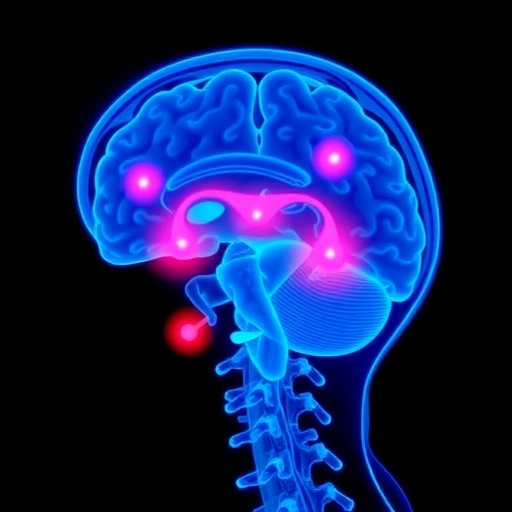In recent scientific developments, spinal cord stimulation (SCS) has emerged as a groundbreaking approach for various neurological conditions. A novel study spearheaded by Huang et al. has shed light on the efficacy of short-term spinal cord stimulation in patients suffering from brain injuries and disorders of consciousness. This significant research offers promising insights into therapeutic interventions that could aid in substantial recovery and rehabilitation for these individuals.
Patients with brain injuries often face numerous challenges, notably the potential for disorders of consciousness, which can severely impact their quality of life and present a major hurdle for medical treatment. These disabilities can range from minimally conscious states to unresponsive wakefulness syndromes. The inability to communicate or interact with the environment puts these individuals at a heightened risk of respiratory complications, leading to the necessity of tracheostomy—a procedure that can complicate further respiratory care. Understanding the potential for SCS to facilitate tracheal decannulation, the process through which patients can be liberated from tracheostomy tubes, becomes paramount for enhancing patient outcomes.
The significance of this study lies not only in its findings but also in its implications for clinical practice. Huang and colleagues embarked on a meticulous trial focused on the impact of short-term SCS on tracheal decannulation rates among individuals with severe brain injuries. Their methodology incorporated a comprehensive assessment of participant eligibility, ensuring a robust and thorough investigation. By employing rigorous selection criteria, they were able to isolate the effects of spinal cord stimulation from other therapeutic practices that may influence respiratory outcomes.
Initial results from the study highlighted an increase in tracheal decannulation rates among patients subjected to SCS compared to a control group. This outcome is especially compelling, considering the complexity of managing ventilation and airway support in this patient population. The exact mechanism through which SCS may facilitate these improvements is an area ripe for exploration. It is hypothesized that the stimulation of certain pathways in the spinal cord could enhance respiratory muscle function, thereby improving the ability to breathe independently and reduce dependence on mechanical ventilation.
Moreover, the research delves deeper into understanding the physiological responses elicited by spinal cord stimulation. One proposed theory involves the modulation of neural circuits that control respiratory function. By stimulating specific spinal segments, it may be possible to alter the excitability of these circuits, leading to enhanced respiratory drive and improved gas exchange. This pioneering concept bridges a novel intersection between neurology and respiratory medicine, providing a comprehensive perspective on patient management techniques.
Huang et al.’s work further addresses the timeline associated with SCS treatment. Notably, the short-term application of spinal stimulation appeared sufficient to yield considerable benefits, challenging prevailing notions that long-term treatments are necessary for meaningful clinical changes. This finding could transform the treatment landscape by offering a less invasive, time-efficient intervention that can be rapidly implemented in critical care settings.
The study’s implications extend beyond tracheal decannulation. Improved respiratory function can lead to better oxygenation and overall metabolic stability, which are crucial for recovery in critically ill patients with brain injuries. Enhanced respiratory efficiency may also lead to the reduced incidence of pneumonia—a common complication in patients with delayed tracheal decannulation—which often prolongs hospital stays and complicates recovery trajectories.
Additionally, the research acknowledges the importance of multidisciplinary approaches in rehabilitative care. Collaboration among neurologists, rehabilitation specialists, and respiratory therapists is essential to optimize outcomes for these patients. By integrating SCS into the broader spectrum of rehabilitative care, healthcare teams can create personalized treatment plans that consider each patient’s unique circumstances and challenges.
As researchers and clinicians continue to explore the realms of spinal cord stimulation, there is a significant opportunity to expand its applicability. Future studies could investigate varying parameters of stimulation, including duration, amplitude, and frequency, to further delineate optimal conditions for therapeutic efficacy. Broader populations, including those with different types of neurological deficits, could also be involved to understand the full scope of SCS applications.
The excitement surrounding Huang et al.’s findings ignites further inquiries into related methodologies such as neuromodulation and its potential role in other areas of medical practice. The convergence of technology and neuroscience presents fertile ground for innovations that may lead to breakthroughs in treating not just respiratory issues but numerous neuromuscular disorders.
As the medical community continues to scrutinize these advancements, the implications of Huang et al.’s study may stretch far beyond tracheal decannulation. This research lays the foundation for future inquiries into the neural mechanisms underlying respiratory function, mobilization strategies post-brain injury, and the integration of novel therapies into existing rehabilitation protocols.
In conclusion, Huang et al.’s groundbreaking work on short-term spinal cord stimulation serves as a beacon of hope for patients with brain injuries and disorders of consciousness. It signals a revised perspective on the management of respiratory complications in this demographic and paves the way for refining therapeutic interventions tailored to promote recovery and enhance quality of life. As further research unfolds, the potential for SCS to transform clinical outcomes continues to grow, representing a critical juncture in neurological rehabilitation.
Subject of Research: Short-term spinal cord stimulation and its effects on tracheal decannulation rates in brain injury patients.
Article Title: The short-term spinal cord stimulation improves the rates of tracheal decannulation in patients of brain injury with disorders of consciousness.
Article References:
Huang, G., Wang, D., Chen, Q. et al. The short-term spinal cord stimulation improves the rates of tracheal decannulation in patients of brain injury with disorders of consciousness. BMC Neurosci 26, 33 (2025). https://doi.org/10.1186/s12868-025-00951-x
Image Credits: AI Generated
DOI: 10.1186/s12868-025-00951-x
Keywords: Spinal cord stimulation, brain injury, tracheal decannulation, disorders of consciousness, respiratory function, neuromodulation.




